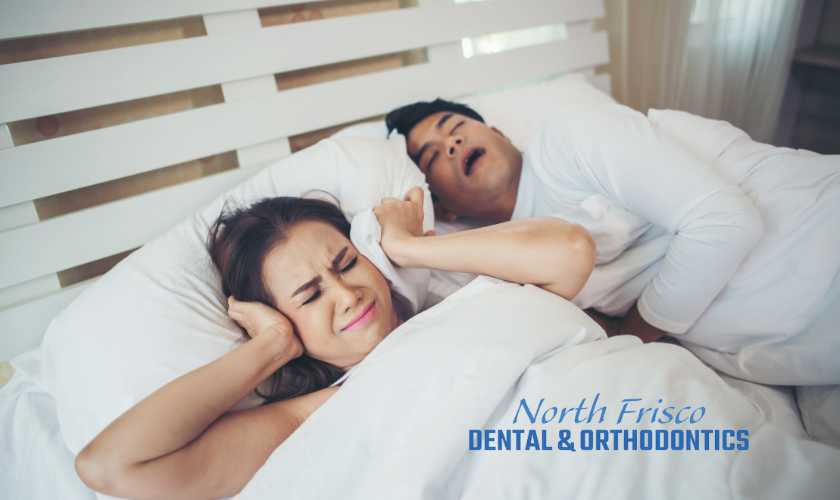Sleep apnea is a condition in which a person’s breathing stops for significant periods while sleeping. It affects people of all ages, but it is more prevalent among men. Repeated pauses in breathing are the most visible symptom of sleep apnea. Your body’s oxygen supply will be disturbed if you do nothing, leading to serious medical complications. Our dentists at North Frisco Dental & Orthodontics have come up with a few ideas to assist you in dealing with this problem.
Contents
What is Sleep Apnea?
Before we get into the answers, let’s look at what sleep apnea is. Sleep apnea is a medical condition characterized by frequent pauses in breathing while sleeping, which can compromise oxygen flow. As illustrated below, sleep apnea can be divided into three categories.
- Obstructive Sleep Apnea (OSA)
- Central Sleep Apnea
- Mixed Sleep Apnea
If not treated promptly by your Frisco dentist, this problem can lead to cardiac arrests, high blood pressure, and even death.
How To Keep Sleep Apnea Under Control?
Sleep apnea can be exceedingly harmful and lead to various health problems if left untreated. Most people are entirely ignorant that they have a problem and incorrectly believe that their sleeping habits are regular. Your favorite dentist in Frisco has provided some advice on dealing with sleep apnea symptoms.
1. Keep A Check On Your Weight
Dentists typically advise sleep apnea patients to lose weight. If you’re overweight, you’re more prone to develop airway congestion and small nasal airways. These can make it difficult to breathe while you sleep, either momentarily or permanently. If you carry a healthy weight, you can avoid this condition. Maintaining a healthy weight might help keep your airways open and reduce sleep apnea symptoms. It might even be able to solve the issue. Please visit our dental office in Frisco for more information on treating your sleep apnea.
2. Use Specific Devices
Dental appliances that straighten your jaw or tongue can help you regulate and address sleep apnea symptoms. This prevents your airway from becoming blocked as you sleep. Mandibular advancement devices and tongue stabilizing devices can assist relieve the blockage at the rear of your throat. Consult your Frisco dentist to determine if they suit your dental health. They are practical and might help you to feel better.
3. No More Tobacco & Alcohol
Significant adjustments in your lifestyle can improve your sleep and help you live a healthy life. Stop smoking and limit your alcohol consumption to avoid sleep apnea. When you drink alcohol, your throat muscles typically relax. This could lead to snoring and a sleep routine that is interrupted. It may also cause inflammation in your airways, making breathing difficult. Tobacco smoking, like alcohol consumption, can induce swelling and inflammation in the tissues of the lungs. If you already have a health problem, this could aggravate it.
4. Alter Your Sleeping Position
Sleeping in a different position can improve your sleep and alleviate your symptoms. According to a study, lying on your back can aggravate the symptoms, commonly known as supine posture. When you sleep on your side, you can regain control of your breathing. It is essential that you discuss your sleeping posture with your dentist to manage your difficulties successfully.
We hope this blog has helped you to learn more about sleep apnea. Get in touch with us at North Frisco Dental & Orthodontics if you look for the best sleep apnea treatments in Frisco, TX.
